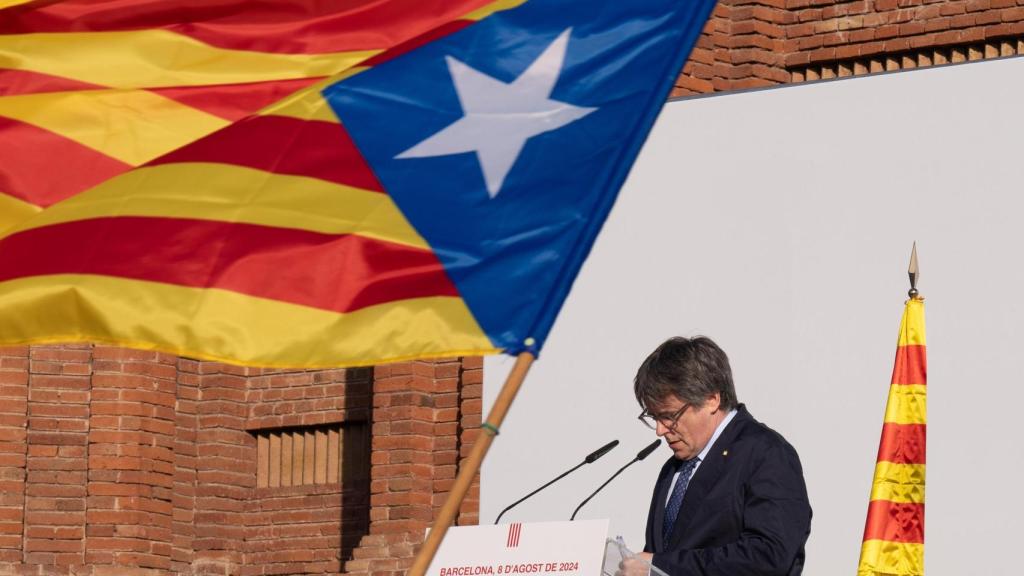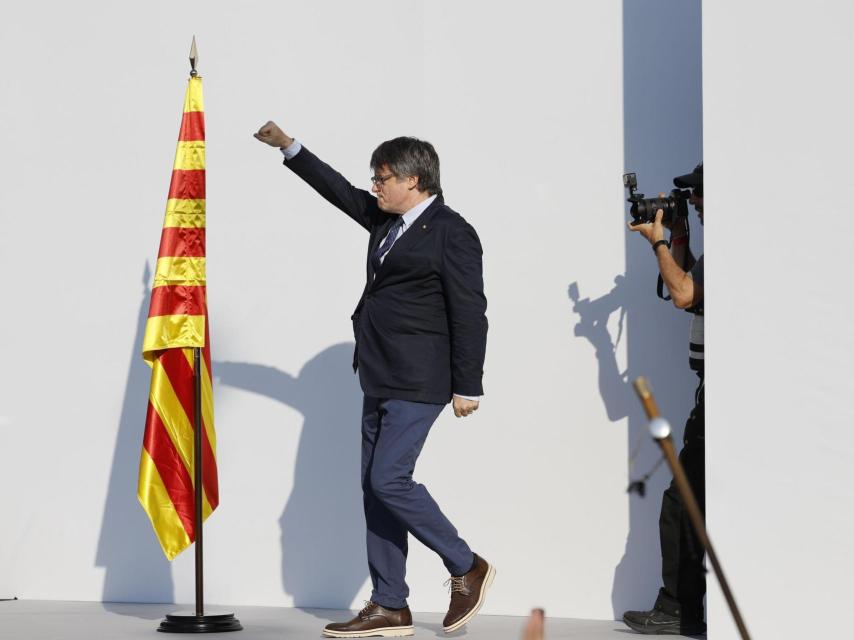
Carles Puigdemont, frente al Parlament, el pasado 8 de agosto.
La ensoñación de Carles Puigdemont
Son los jueces los que aplican la ley de amnistía, no el señor Puigdemont ni los políticos, teniendo en cuenta las disposiciones constitucionales y el Derecho de la Unión Europea.
Hans Kelsen, en su obra Teoría general del Estado, define el golpe de Estado como cualquier modificación o sustitución de la Constitución realizada sin seguir los preceptos en ella establecidos para realizar tal reforma.
No es necesario que ello comporte el uso de la violencia ni intervención militar alguna. Basta con romper con el principio básico del Estado de derecho mediante el cual las normas deben ser producidas, modificadas o anuladas de conformidad con lo que esté legalmente establecido.
Eso es lo que tuvo lugar en Cataluña, fundamentalmente durante el otoño de 2017, siendo Carles Puigdemont presidente de la Comunidad Autónoma.

Carles Puigdemont, el jueves 8 de agosto, en su regreso a Barcelona tras siete años huido de la Justicia.
Bajo su auspicio fueron aprobadas las denominadas leyes de desconexión, la ley del referéndum de autodeterminación y la ley de transitoriedad jurídica e instauración de la república. Ambas fueron declaradas inconstitucionales por el Tribunal Constitucional español ya que, a modo de leyes habilitantes, pretendían dejar sin aplicación la Constitución Española y el Estatuto de Autonomía de Cataluña.
También pretendían preparar la realización de un referéndum de autodeterminación, así como fundamentar una declaración unilateral de independencia.
Todo ello implicaba la ruptura del sistema constitucional y, con el apoyo de los partidos y las organizaciones secesionistas en las instituciones y en la calle, obligar a que la ciudadanía de Cataluña aceptara la secesión.
Por estos hechos que, evidentemente, precisaban de apoyos y de logística personal y financiera, varios miembros del gobierno de Puigdemont y de las organizaciones secesionistas fueron juzgados por los correspondientes tribunales. El Tribunal Supremo condenó por sedición (uno de los delitos contra el orden constitucional) y malversación de fondos públicos, pues el Código Penal español no regula los golpes de Estado, sino los delitos contra la constitución.
"En todo Estado de derecho son los jueces y tribunales quienes aplican la ley, teniendo en cuenta lo que esta dispone e interpretándola de acuerdo con las reglas comúnmente establecidas"
Puigdemont, que no pudo ser juzgado en su momento, puesto que huyó y se instaló en Bélgica en un continuo desafío a la justicia, acaba de realizar otra rocambolesca actuación, huyendo otra vez de España para no ser detenido conforme a la ley y afirmando que son los jueces quienes actúan ilegalmente y contra la democracia.
Puigdemont se queja de que no le aplican correctamente la ley de amnistía y de que no realizó malversación alguna puesto que el fracasado referéndum ilegal del 1 de octubre de 2017 se financió con aportaciones voluntarias de particulares.
En todo Estado de derecho son los jueces y tribunales quienes aplican la ley, teniendo en cuenta lo que esta dispone e interpretándola de acuerdo con las reglas comúnmente establecidas. Son los jueces quienes, en sus sentencias, precisan el alcance de los preceptos legales.
Por ello, la aplicación de la ley de amnistía se realiza por los jueces, no por el señor Puigdemont ni por los políticos, teniendo en cuenta las disposiciones constitucionales y el Derecho de la Unión Europea. Es a los jueces a quienes corresponde por tanto definir el significado y alcance de la malversación, en especial cuando tienen que decidir si tal delito está o no cubierto por la ley de amnistía.
En tal sentido, los jueces precisan si el delito comporta o no lucro personal para quien lo ha realizado, y es así razonado en las sentencias. Al mismo tiempo, son ellos, los jueces, quienes tienen que definir qué significa ese lucro personal, como incremento patrimonial o como otra forma de ventaja o enriquecimiento.
En tal sentido, el Tribunal Supremo ha considerado que el uso de caudales públicos para financiar las actividades de la secesión, no únicamente el pretendido referéndum del 1 de octubre, sino todas ellas en su conjunto, ha originado ventajas económicas en los autores del delito y, por consiguiente, no les es de aplicación la ley de amnistía.
Es evidente que el señor Puigdemont pretende, con sus afirmaciones actuales, cambiar el sentido de los hechos habidos durante su mandato como presidente de la Generalitat. Al afirmar que el referéndum ilegal del 1 de octubre se financió con aportaciones de particulares quiere obviar la aplicación de la doctrina que el Tribunal Supremo ha establecido cuando juzgó a sus consejeros.
"Existen indicios de delito. Y por ello es deber de los jueces españoles llegar al fondo del asunto. No se trata de una opción política, sino del cumplimiento del mandato del Estado de derecho"
Pero no tiene en cuenta que la sentencia del Tribunal Supremo no se centra en los gastos originados por el 1 de octubre, sino en el conjunto de la actividad secesionista de su gobierno, tal como, además, ha advertido el Tribunal de Cuentas.
Tribunal de Cuentas que, por su parte, ha presentado una cuestión prejudicial ante el Tribunal de Justicia de la UE para delimitar si la regulación de la Ley de amnistía sobre la malversación es contraria al Derecho de la UE.
Es evidente que existe controversia acerca del alcance de este delito. Por algo se han presentado sendas cuestiones de inconstitucionalidad y prejudiciales. Y por ello es necesario que la investigación judicial continúe. Es más, en todo Estado de derecho es obligación de los jueces la persecución del delito cuando existen indicios del mismo.
Recordemos, también, que cuando el tribunal alemán del land de Schleswig Holstein abordó el examen de la orden europea de detención y entrega emitida por España contra Puigdemont, este tribunal estaba dispuesto a realizar la entrega por el delito de malversación.
Existen indicios de delito. Y por ello es deber de los jueces españoles llegar al fondo del asunto. No se trata de una opción política, sino del cumplimiento del mandato del Estado de derecho.
En este sentido, los jueces españoles que pretenden procesar a Puigdemont están haciendo precisamente lo que los Tratados de la Unión y la Comisión, como guardiana, han pedido a los jueces húngaros y antes polacos: defender la igualdad de los ciudadanos ante la ley y no permitir la creación de élites políticas que estén por encima de la ley.
*** Teresa Freixes es catedrática de Derecho constitucional y catedrática Jean Monnet ad personam.
***
ENGLISH VERSION
Hans Kelsen, in his work General theory of Law and State defines a coup d'état as any modification or substitution of the Constitution without following the requirements established in it in order to reform it. The use of violence is not necessary, nor is any intervention by the military. It suffices to breach the basic principle of Rule of Law, according to which legal norms need to be created, modified or abolished in accordance with what is legally established.
This is precisely what happened in Catalonia in the autumn of 2017, when Carles Puigdemont was the President of the Catalan regional government. Under his leadership, the so called "disconnection laws" were adopted: the Law on the self-determination referendum and the Law on the legal transition and the instauration of the republic.
Both acts were declared unconstitutional by the Spanish Constitutional Court since they sought to disapply in Catalonia the Spanish Constitution and the rest of the Spanish legal order, and pretended to culminate in a unilateral declaration of independence. All this involved the breakdown of the constitutional order, and to force the Catalan citizens, with the support of the secessionist political parties and civil organisations in the institutions and on the streets, to accept the secession from Spain.
For these facts, several members of Puigdemont's government and of the secessionist organisations were put on trial by the courts. The Supreme Court issued sentences for sedition (one of the offences against the constitutional order) and embezzlement of public funds. The Spanish Criminal Code does not regulate the coups d'état, but rather punishes offences against the Constitution.
Puigdemont, who back in 2017 fled to Belgium in a defy of the justice system, has just committed his next stupefying move absconding once again in order not to be arrested in accordance with the law and arguing that it is the Spanish judges who act illegally and against democracy. He complains that the Amnesty Law is not being applied to him and affirms not to have committed any embezzlement as the independence referendum was, according to him, financed with "voluntary contributions".
In any Rule of Law state, it is the judges and the courts who apply the law, interpreting it in accordance with generally established principles and rules. It is the judges in their court sentences, who delimit the extent of the legal provisions.
Thus, the application of the Amnesty Law will be carried out by the judges, taking into account the constitutional law and the law of the European Union, and not by Mr Puigdemont or by the politicians. It is up to the judges to interpret the meaning and extent of embezzlement when deciding if this particular offence is covered or not by the Amnesty Law.
It is equally up to the judges to establish whether an embezzlement requires a personal benefit and what a "personal benefit" means: an increase of one's patrimony or another form of advantage or gain. In this sense, the Supreme Court has considered that the use of public means to finance not only the unconstitutional referendum of 1 October 2017, but the totality of secessionist activities, has caused economic benefits to the authors of the offence and therefore the Amnesty Law cannot be applied to them.
It is evident that Mr. Puigdemont seeks, through his latest statements, to justify his defiance of the Rule of Law by now stating that the illegal independence referendum was financed by "voluntary contributions". The embezzlement in question, however, covers all secessionist activities, as it has been stated by the Spanish Court of Auditors that has recently submitted a question for preliminary ruling to the Court of Justice of the European Union as to whether the Amnesty Law's regulation of embezzlement is compatible with EU law.
It is not unusual that there are different interpretations of the law. This is precisely why the judges in charge have submitted several questions of constitutionality and for preliminary rulings. And this is why the judicial investigation needs to continue its course. In any Rule of Law state, it is even the obligation of the judges to pursue a criminal offence if there are indications pointing to its existence.
We should be reminded in that sense that when the German Higher Regional Court of Schleswig-Holstein was concerned with the European Arrest Warrant against Puigdemont, it was ready to surrender him for embezzlement.
There are certainly indications that an offence was committed. It is therefore the very obligation of Spanish judges to investigate the matter until the very end. It is not a political option but the compliance with the Rule of Law as one of the basic principles of the European Union.
In that sense, the Spanish judges seeking to put Puigdemont on trial are doing precisely what the Union Treaties and the Commission as their guardian have been asking Hungarian and before that Polish judges to do: to uphold the equality of the citizens before the law and not to allow the creation of political elites that are above the law.
*** Teresa Freixes is professor in Constitutional Law and professor Jean Monnet ad-personam.
